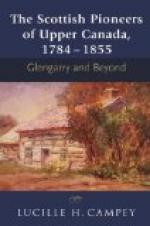The Indian who had volunteered to carry the canoe proved unequal to his task. But Hearne found another of his carriers who was willing to take the burden. In order, therefore, to be readier with his gun to shoot deer, he transferred a portion of his own load to the ex-canoe carrier. This portion consisted of the invaluable quadrant and its stand, and a bag of gunpowder. The gunpowder was of such importance to Hearne and his party that one wonders he made this exchange; for if he lost this powder he had no means of killing game, and was entirely dependent for food on the troop of Indians with whom he was travelling, and whom he knew to be most niggardly and inhospitable. Judge, therefore, of his horror when, at the end of a day’s march, this weakly Indian porter was missing with his load. All night Hearne was unable to sleep with anxiety, and the whole of the next day he spent searching the rocky ground for miles to discover some sign of the missing man. At that season of the year it was like looking for a needle in a pottle of hay, for there was no snow, and equally no herbage, on which a man’s foot could leave traces. However, at last, by some miracle, they discovered the load by the banks of a little river where a party of Indians had crossed.
Shortly afterwards, leaving his quadrant on its stand for a few minutes, whilst he went to eat his dinner, a violent wind arose and blew the whole thing on to the rocks, so that the quadrant was smashed and rendered useless. On this account he determined once more to return to Fort Prince of Wales. The Northern Indians[3] with whom Hearne travelled backwards towards the fort were most inhospitable, not to say dangerous. They robbed him of most of his goods, and refused to allow their women to assist his people to dress the reindeer skins out of which it would be necessary shortly to make coverings to protect them from the severe cold of the autumn. In fact Hearne was in rather a desperate condition by September, 1770, when he was joined by a party of Indians under a famous leader, whom he calls Matonabi.
[Footnote 3: The Indians of the Athapaskan or Dene group were usually called the Northern Indians by the Hudson Bay people, in comparison to all the other tribes of the more temperate regions farther south, who were known as the Southern Indians (Algonkins, &c.).]
Matonabi, though of Athapaskan stock, had, when a boy, resided several years at Prince of Wales’s Fort, and learnt a little English, and, above all, was a master of several Algonkin dialects or languages, so that he could discourse with the Southern Indians. As soon as he heard of Hearne’s distress he furnished him with a good, warm suit of skins, and had the reindeer skins dressed for the Indian carriers who accompanied Hearne. In journeying together, Matonabi invited him to return once more, with himself as guide, to discover the copper mines.




